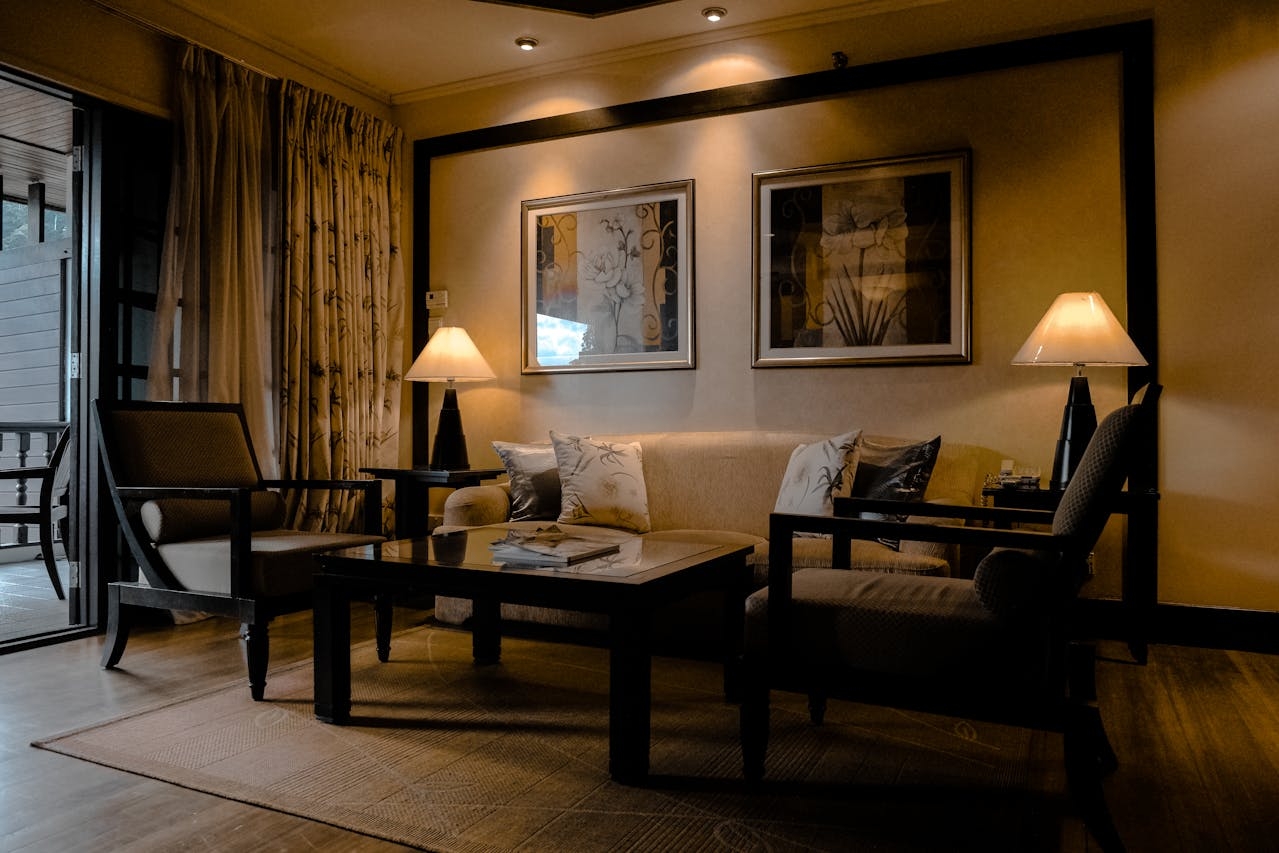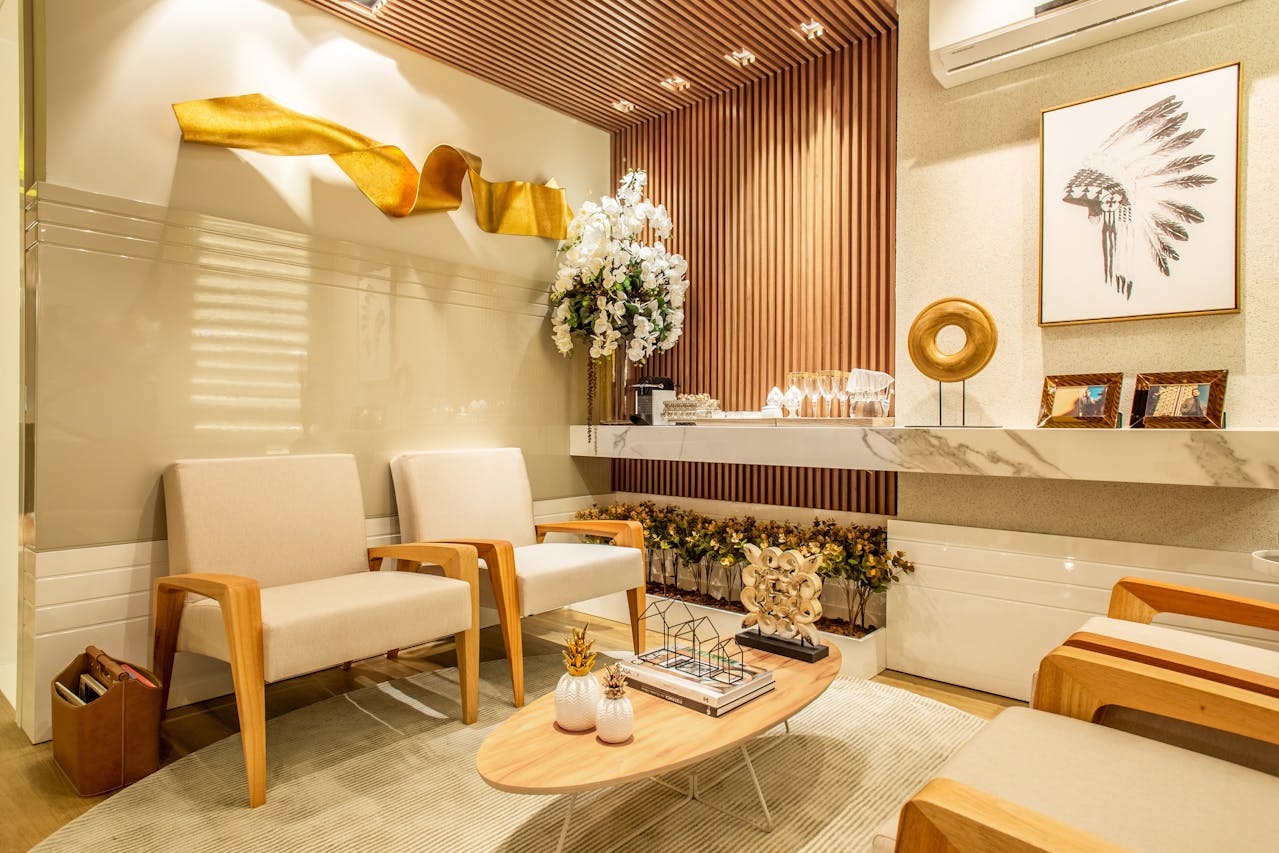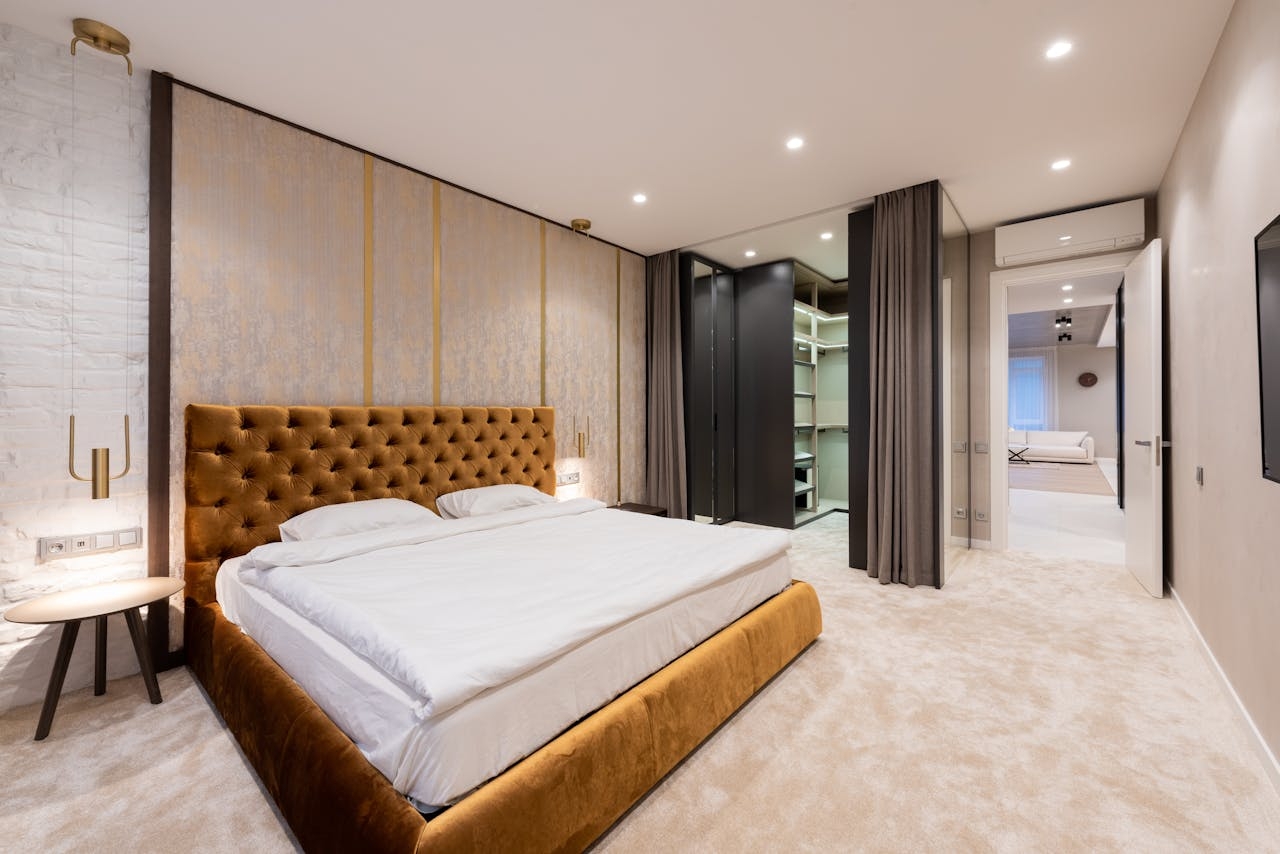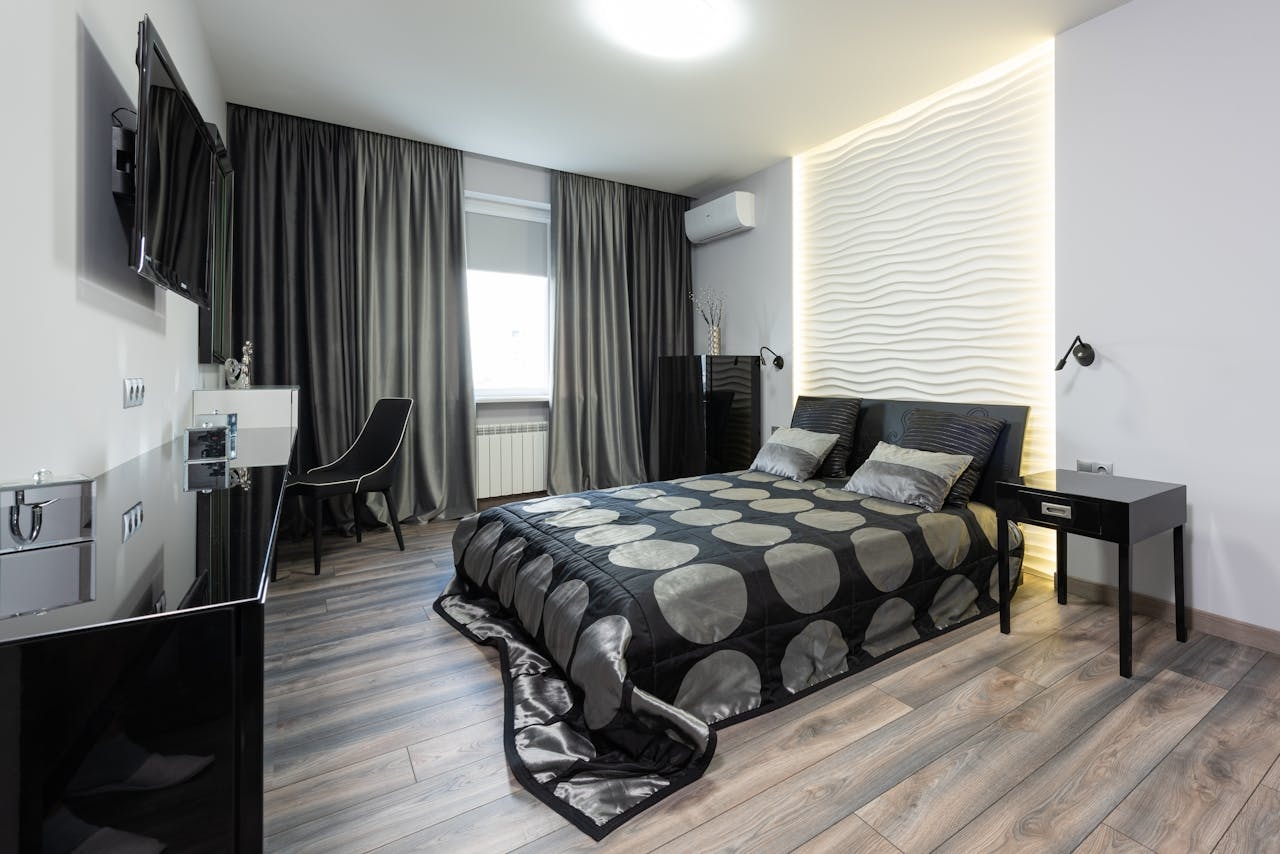Where Do Hotels Get Their Furniture?
By Nikita Nielsen · 17. April 2024
Where do hotels get their furniture?
From specialty suppliers, wholesalers, and direct manufacturers who deliver functional and stylish pieces tailored to a hotel’s brand.
This article unveils the intricate network and sourcing strategies behind those elegant lobbies and cozy hotel rooms.
Join us as we delve into the intricacies of hotel furniture acquisition, introduce you to the key🔑 industry figures, and guide you through the critical factors that shape the selection process.
Key Takeaways
- Hotel furniture sourcing is a complex process involving specialized suppliers and intricate logistics, ensuring furniture aligns with the hotel’s brand and aesthetic while providing durability and custom services.
- The selection of hotel furniture is driven by a balance of durability, aesthetics, functionality, and budget, all of which significantly affect guest satisfaction and retention.
- Current trends in the hotel furniture industry include sustainable and eco-friendly designs, multifunctional and space-saving solutions, and technology integration to meet changing guest expectations.
Hotel Furniture Sourcing: Key Stakeholders and Processes
 Brown Wooden Sofa Set With Lighted Table Lamp
Brown Wooden Sofa Set With Lighted Table Lamp
The journey of a piece of furniture from a manufacturer to a hotel room is a complex process involving a network of specialized suppliers and intricate logistics.
This process plays a significant role in making sure the furniture pieces serve their purpose and resonate with the hotel’s brand and aesthetic appeal.
Large hotels typically have specialized purchase departments that establish relationships with global suppliers and manufacturers to have access to a wider range of designs and avoid paying retail margins.
Specialized Hotel Furniture Suppliers
Specialized hotel furniture suppliers, with their extensive range of options and deep expertise in both design and quality, tailor their offerings to the hospitality industry’s requirements.
As a furniture supplier, their primary focus is on high-quality contract furniture that can withstand the rigorous use within a hotel setting.
Moving beyond the basics, some suppliers also offer a suite of value-added services.
These include custom furniture design, 3D rendering, project management, and installation, all thoughtfully designed to cater to the unique needs of hotels and leisure facilities.
Hotels can achieve a blend of aesthetic appeal, functional design, and lasting quality in their furniture selections thanks to the bespoke service offered by specialized suppliers.
Wholesalers and Manufacturers
Wholesalers and manufacturers provide high-quality and stylish furniture options that are cost-effective and convenient for hotels, thus playing a critical role.
By working with suppliers that provide a variety of customization services, hotels can personalize guest experiences and decrease complexity.
A strong relationship with reliable wholesale suppliers contributes to the smooth functioning of hotel operations and consistent guest satisfaction.
Working with wholesalers, hotels meet effective inventory management and operational demands by considering factors such as minimum order quantities and delivery lead times.
The Sourcing Process
The sourcing process is much more than just selecting and buying furniture. It includes finalizing Furniture, Fixtures, and Equipment (FF&E) products, overseeing order management, delivery, and installation logistics.
Budget hotels, in particular, engage in strategic procurement practices, such as planning ahead, to manage costs effectively while adhering to their budget constraints.
Procurement plans are reevaluated with considerations for sourcing domestically to maintain transparency and meet project timelines due to import issues and long delivery times.
To align design goals with functionality and budget in hotel furniture sourcing, efficient project management emphasizes early planning, timely future orders, and collaboration with procurement partners.
Factors Influencing Hotel Furniture Selection
 White and Brown Modern Hotel Living Room Interior Design
White and Brown Modern Hotel Living Room Interior Design
Selecting the right furniture for a hotel is no easy task.
It requires a delicate balance of various factors, including:
- Durability
- Aesthetics
- Functionality
- Budget considerations
All of these factors contribute significantly to guest satisfaction and retention.
We will discuss each of these factors in detail to provide a comprehensive understanding of what influences hotel furniture selection.
Durability and Quality
When it comes to hotel furniture, durability is a primary consideration. Here are some factors to consider:
- Materials like solid wood provide strength and longevity.
- High-quality craftsmanship, including sturdy joints and reinforcements, is crucial to prevent premature wear and tear.
- Rigorous testing for durability, certifications, and quality assurance standards are in place to ensure the longevity of the furniture.
Hotel chains make a long-lasting and cost-effective investment in high quality furniture by choosing durable pieces from reputable suppliers.
Aesthetics and Ambiance
 Modern hotel bedroom with table next to bed and wardrobe
Modern hotel bedroom with table next to bed and wardrobe
Aesthetics play a crucial role in hotel furniture selection.
The furniture must align with the hotel’s visual theme and contribute to creating an inviting ambiance.
Balancing aesthetics with durability is essential, necessitating the selection of materials that provide visual appeal and are highly durable, such as hardwoods and quality laminates, while customization allows for a tailored aesthetic and durability.
Streamlined modern minimalism, a trend in hotel furniture known for its clean lines and sleek designs, also contributes to space efficiency and a sophisticated hotel aesthetic.
Functionality and Comfort
Functionality and comfort are essential aspects of hotel furniture.
Some key features to consider include:
- Ergonomic designs
- Ample storage options
- High-quality materials
- Comfortable seating and bedding
These features are critical to meet hotel guests’ practical needs and ensure satisfaction.
By prioritizing functionality and comfort, hotels can create spaces that guests can enjoy, from guest rooms to social zones.
Guests can select from adjustable and tailored furniture options, enhancing their comfort and experience, thanks to increasing trends in customization and personalization.
Budget Considerations
Budget considerations play a significant role in hotel furniture selection.
Hotels must balance cost-effectiveness with quality, considering the long-term cost-effectiveness of their furniture investments, rather than merely the initial purchase cost.
By working with wholesale hotel suppliers to purchase in bulk and thoughtfully designing spaces, hotels can significantly cut operational costs while creating a distinctive environment that increases guest bookings.
Trends Shaping the Hotel Furniture Industry
 Bedroom interior in white and black
Bedroom interior in white and black
Like any other industry, the hotel furniture industry is also shaped by current trends.
These trends reflect the changing preferences and expectations of guests, and understanding them is crucial for hotel owners and operators to stay competitive.
Next, we will focus on the three key trends shaping the hotel furniture industry: sustainable and eco-friendly designs, multifunctional and space-saving solutions, and technology integration.
Sustainable and Eco-friendly Designs
Heightened environmental concerns have led to the prevalence of eco-friendly and sustainable furniture designs in the hotel furniture industry.
Sustainable hotel furniture is often constructed from materials like organic fabrics (such as wool, linen, cotton), unfinished timbers, reclaimed materials, and recycled wood, metals, and plastics.
Eco-friendly🌱 manufacturing processes also play a key role, including the recycling of timber waste and cardboard, using non-toxic stains, and utilizing low-impact energy sources.
These practices contribute to cost savings and can also give hotels a competitive edge in the industry.
Multifunctional and Space-saving Solutions
Contemporary hotel furniture design increasingly reflects the necessity for multifunctionality in response to space constraints, particularly in urban areas.
Multifunctional pieces such as storage ottomans, fold-out desks, and Murphy beds are being incorporated in hotel rooms to serve multiple purposes while occupying the same footprint.
To accommodate the demand for space efficiency, hotels are introducing scaled-down furniture items including slim platform beds, compact shelving units, and narrow consoles.
Technology Integration
Incorporating technology into hotel furniture is essential as guests expect modern amenities to support their digital needs for both leisure and work-related activities.
Hotels are integrating smart features into furniture, including power outlets and USB ports built into lamps, nightstands, and desks, along with smart room systems permitting control of lighting, temperature, and entertainment via smartphones or voice commands.
Technological advancements in hotel furniture now encompass adjustable beds controlled via apps, offering guests a customizable sleeping experience.
Collaborating with Designers and Architects
 Architects Pointing at a Building Plan
Architects Pointing at a Building Plan
Creating a distinctive hotel atmosphere involves more than just selecting the right pieces of furniture.
It requires a thorough understanding of the hotel’s brand message and story, which can be best reflected through the collaboration with designers and architects.
Next, we will explore the role of these professionals and how collaboration benefits in shaping a hotel’s atmosphere.
The Role of Designers and Architects
Reflecting a hotel’s brand message and story in the property’s overall aesthetic and ambiance, designers and architects play a critical role that directly affects guests’ decisions to choose the hotel.
Successful🏆 architecture and interior design for hospitality must begin at the project’s outset and continue through to completion, focusing on well-thought-out planning and the use of high-quality materials.
Through thorough project management, they oversee every stage from conceptualization to the final deliverables.
Benefits of Collaboration
Hotels benefit in numerous ways through collaboration with designers and architects.
Strategic alliances with these professionals can provide comprehensive services and experiences, enhancing the hotel’s value proposition and competitive advantage.
Knowledge sharing and training programs facilitated by collaboration promote professional development and a culture of continuous learning within the hospitality industry.
At the same time, shared customer loyalty programs between hotels and design professionals can foster loyalty and create a seamless experience for guests.
Summary
From sourcing processes to selection criteria, from current trends to collaboration with designers and architects, it’s clear that the journey of furniture in the hotel industry is a complex and intricate process.
With a deep understanding of these aspects, hotel owners and operators can create inviting, functional, and memorable spaces for their guests while also ensuring cost-effectiveness and sustainability.
Frequently Asked Questions
Who supplies furniture to hotels?
Hotels source their furniture from specialized suppliers who offer a comprehensive range of products suitable for various needs, such as upgrading bedrooms, refitting reception areas, and managing complete FF&E fit-outs. These suppliers provide a seamless service that helps to ensure hotel projects are executed smoothly.
What is hotel furniture called?
The furniture found in hotels is known as hospitality or commercial furniture, and it includes items such as headboards, nightstands, coffee tables, and dining tables among others.
What do hotels do with their old furniture?
Hotels usually sell their old furniture to used furniture wholesalers, who may then resell it to other hotels or renovate it for further use.
How do hotels get their furniture?
Hotel owners often work with distributors or contact furniture manufacturers directly to ensure they get pieces that meet the needs of their guests. Working with a distributor or manufacturer allows them to source furniture that is best suited for their hotel’s requirements.
What factors influence hotel furniture selection?
The key factors that influence hotel furniture selection are durability, aesthetics, functionality, and budget considerations. These factors play a crucial role in ensuring that the furniture meets the hotel’s standards and requirements.

